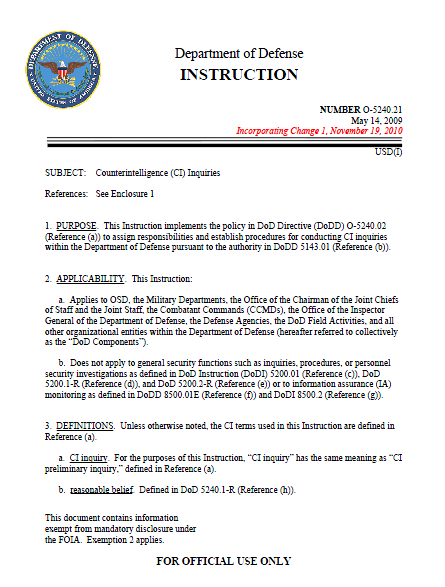The following instruction is part of a series of “limited release” DoD doctrine publications that are not released to the public.
Instruction O-5240.21: Counterintelligence (CI) Inquiries
- 9 pages
- For Official Use Only
- May 14, 2009; Incorporating Change 1, November 19, 2010
1. INITIATING CI INQUIRIES
a. The CCMDs and Defense Agencies with organic CI assets shall initiate a CI inquiry upon receipt of information that cannot be resolved through security procedures, such as:
(1) The existence of a clandestine relationship between DoD personnel and agents of a foreign power, or of relationships between DoD personnel and individuals associated with international terrorist organizations.
(2) Failure to report contact with a foreign intelligence service.
(3) Other intelligence and/or international terrorist threats directed against U.S. Government or military facilities, property, information, operations, or personnel that appear to be at the behest of a foreign power or international terrorist organization.
(4) Failure to comply with the reporting requirements of DoDI 5240.6 (Reference (m)).
b. The goal of the CI inquiry is to establish or refute a reasonable belief that a particular person is acting for or on behalf of, or an event is related to, a foreign power engaged in spying or committing espionage, sabotage, treason, sedition, subversion, assassinations, or international terrorist activities.
c. The CCMDs and Defense Agencies shall use DCHC guidelines and reporting processes to document CI inquiries.
d. The CCMDs and Defense Agencies shall not delay the initiation of a CI inquiry for any improper purpose, to include attempts to delay the initiation of a CI inquiry to permit the use of otherwise prohibited techniques through security or other inquiry methods.
2. CONDUCTING CI INQUIRIES
a. CI inquiries shall be conducted in accordance with Reference (h).
b. (FOUO) Within the Department of Defense, only Military Department CI organizations have CI investigative authority and are authorized to use the intrusive techniques identified in Reference (h). The CCMDs and Defense Agencies are not authorized to use procedures 5 through 11 and procedure 13 of Reference (h). Additional prohibited techniques after the initiation of a CI inquiry are:
(1) (FOUO) Examining any information technology system or information within, except information that was gathered during the course of IA monitoring conducted before the CI inquiry began.
(2) (FOUO) Conducting consensual physical searches.
(3) (FOUO) Questioning the subject of a CI inquiry.
(4) (FOUO) Administering oaths, advising of rights pursuant to the Fifth Amendment to the Constitution of the United States (Reference (n)), and taking sworn statements, excluding unsworn official statements, except when an inquiry officer who is subject to chapter 47 of title 10, United States Code, (Reference (o)) is questioning another person who is also subject to Reference (o). In this case the inquiry officer must be familiar with the requirements of Article 31(b) of Reference (o) and, if necessary, consult with the local servicing judge advocate.
(5) (FOUO) Conducting liaison with Federal or military prosecutors unless accompanied by a representative of a CI investigative agency.
(6) (FOUO) Conducting polygraph examinations of subjects of CI inquiries.
(7) (FOUO) Requesting financial information from non-governmental institutions.
(8) (FOUO) Formally recruiting and tasking human sources.
c. CI inquiries need not be opened to:
(1) Review agency files at the request of an intelligence community (IC) member.
(2) Check agency and DoD databases to determine if an individual holds or held a DoD security clearance and has or had access to classified information or material, and provide the results to an IC member.
(3) Report, through an Intelligence Information Report (IIR), information that does not meet the threshold for initiating a CI inquiry but is of intelligence value.
(4) Report information that indicates a violation of Federal, State, or local laws. This information shall be disseminated to Federal, State, or local law enforcement agencies as appropriate and in accordance with Reference (h).
(5) Resolve internal security matters.
3. FOLLOW-UP ACTIVITIES
a. During a CI inquiry, if information establishes a reasonable belief that a clandestine relationship exists between DoD personnel and agents of a foreign power; that DoD personnel have unreported or unauthorized contact with a foreign intelligence service; or that DoD personnel have relationships with individuals associated with international terrorist organizations, this information shall be reported immediately to DCHC and to the appropriate Military Department CI organization or the FBI.
b. If a CCMD or Defense Agency CI inquiry develops foreign intelligence information or indications of international terrorist threats, this information shall be reported through IIR or directly to the affected organization in accordance with DoDI S-5240.17 (Reference (p)) or DoDD 2000.12 (Reference (q)).
c. Once a matter has been accepted for investigation by the investigative organization, the CCMD or Defense Agency shall terminate its CI inquiry activities, but may continue to document, through the CI inquiry, any assistance provided to the CI investigative organization.
d. CCMD and Defense Agency CI personnel may participate in a CI investigation involving their organization, with the permission and under the direction of the lead investigating Service CI organization or the FBI.

